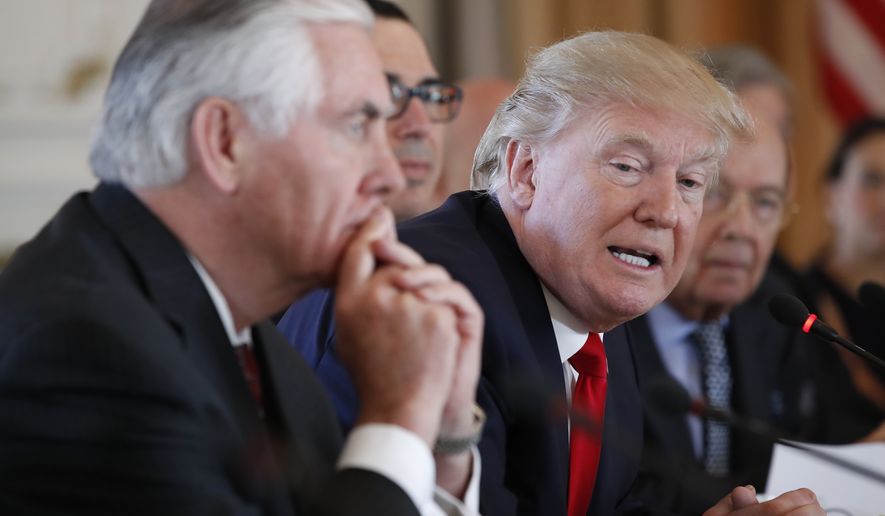Russia and Iran expressed outrage and U.N. officials responded with caution to President Trump’s punitive missile strike against Syria Thursday evening over its suspected use of chemical weapons, but Mr. Trump’s first use of U.S. military force also was met with expressions of support for the action from around the world.
The loudest praise came from U.S. Persian Gulf allies, where Saudi Arabia’s government applauded Mr. Trump’s “courageous decision” to retaliate against what Riyadh called “horrible crimes” committed by forces loyal to Syrian President Bashar Assad.
The Saudi sentiment was echoed behind-the-scenes by other Sunni Arab powers in the region, who said the strikes represented a show of force in line with their desire to contain Syria and, especially, its ally Iran.
Iran, the Middle East’s main Shiite Muslim powerhouse, is viewed as a dangerous rival by several of the region’s Sunni-dominated governments, including Turkey, Egypt, Jordan and the Gulf states.
Israel, which is increasingly aligned with those Arab governments hostile to Tehran, was also among those praising the U.S. strikes against the Assad regime. Israeli Prime Minister Benjamin Netanyahu said Mr. Trump had “sent a strong and clear message” that will be heard far beyond Syria.
The U.S. bombing, Mr. Netanyahu said in a statement, “will resonate not only in Damascus, but in Tehran, Pyongyang and elsewhere.”
Turkish President Recep Tayyip Erdogan, who has clashed with the Trump administration over how to battle the Islamic State in Syria but is an opponent of Mr. Assad’s, also expressed support for Thursday night’s strikes.
Mr. Erdogan told a rally in Turkey on Friday that he would stand behind additional U.S. strikes against Syria. “I welcome this concrete step as positive against the war crimes the Assad regime has committed,” Mr. Erdogan said. “Is it enough? I don’t see this as enough.”
Europe backs U.S. strikes
In Europe, German Chancellor Angela Merkel and French President Francois Hollande issued a joint statement saying that Mr. Assad “alone bears the responsibility for this development,” according to the BBC.
Donald Tusk, the president of the European Council, tweeted that the U.S. strikes showed “needed resolve against barbaric chemical attacks” and that the “EU will work with the U.S. to end brutality in Syria.”
Reactions were more cautious among officials at the United Nations in New York, where the U.N. Security Council discussed the U.S. missile strike during an inconclusive meeting on Friday.
Jeffrey D. Feltman, an American diplomat who is currently the U.N. undersecretary general for political affairs, told the Security Council that immediate action is needed to protect the Syrian people but it should be “rooted in the principles of the United Nations and international law.”
“There can be no genuine protection if the parties to the conflict, government and opposition alike, are permitted to act with impunity and if the Syrian government continues to commit human rights violations against its own citizens,” Mr. Feltman said, according to Reuters.
Russia, meanwhile, condemned the U.S. missile strikes and asserted that it is Washington’s unilateral strike that was in violation of international law.
Tillerson to Moscow
Kremlin spokesman Dmitry Peskov said Russian President Vladimir Putin “considers the American strikes against Syria an aggression against a sovereign government in violations of the norms of international law, and under a far-fetched pretext.”
But Mr. Putin did not make his own public denunciation of the American attack. Some analysts said Mr. Assad had embarrassed his most important ally, as Moscow had guaranteed that Syria’s chemical stockpiles had been removed as part of a 2013 deal to head off military action by the Obama administration.
The attack may even have set the stage for deeper and more serious diplomatic talks over the Syrian war when Secretary of State Rex Tillerson visits the Russian capital next week. Mr. Tillerson is slated to meet with Russian officials in Moscow on April 11.
Despite Iran’s own history as the victim of a mass chemical gas attack by Saddam Hussein in the 1980s, top officials in Tehran on Friday condemned the strikes and accused Washington of hypocrisy and deception.
“The U.S. use of a chemical attack in Syria as a pretext for unilateral action is dangerous, destructive and a violation of peremptory principles of international laws, Iranian Foreign Ministry spokesman Bahram Qassemi told reporters in Tehran, according to a report by the Fars news wire service.
As “the biggest victim of chemical weapons in modern history,” Mr. Qassemi added, Iran “condemns any application of such weapons regardless of the perpetrators and victims.”
But the spokesman echoed doubts expressed by Russia that the Assad regime actually carried out the chemical attack, and noted that “terrorist groups” like Islamic State and al Qaeda have been accused of stockpiling their own chemical weapon arsenals.
Iranian Foreign Minister Javad Zarif on Twitter also raised doubts about the U.S. claims that Mr. Assad ordered the deadly chemical attack on a northern Syrian town controlled an al Qaeda affiliate.
Seth McLaughlin and David Sands contributed to this report.
• Guy Taylor can be reached at gtaylor@washingtontimes.com.




Please read our comment policy before commenting.